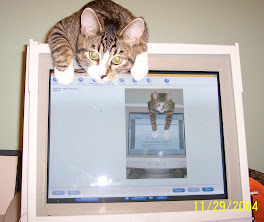Okay, easy enough to upload pictures onto Flickr. It makes me happy to think that if someone is looking to relocate to Royalton they might use Flickr and find that we have this bright, cheery library. (Of course, they might also see the library for Royalton, Vermont, but that's interesting, too.) I can see myself putting more pictures up to showcase library programs, FOL activities, etc.
However, I'm not sure how much I'd use Flickr for my personal photos. It just seems odd and strange to put my pictures out there in the public realm. My partner and I had dinner with a couple of friends on Friday, and we were talking about the generation gap around "public" and "private" information. We are all 40ish to 50ish, and we are all perplexed at how much personal information -- in the form of photos, profile interests, and more -- the avid Flickr'er's, Facebook'ers and MySpace'ers are willing to put on their pages. Put our pictures on the web... pictures of us, of our loved ones? You've got to be kidding! Is it safe? Is it secure? Is it appropriately modest social behavior?
So in that context, no thank you. However, to showcase the great little library that this small community is so proud of... well that's something I can get behind.
Also on Friday I had the opportunity to spend the day going back and forth between exploring the exhibits at the St. Paul Science Museum and spending time in the atrium reading over pages and pages of articles about Library 2.o, Web 2.0, etc. It was glorious. So nice to take a day to not just learn about some of this stuff but also to have time to actually think about it (and then go play with animation technology or look at dinosaur fossils).
One thing I found very interesting was an article about Beacon, a pesky little advertising program used by Facebook that keeps track of users' visits to certain web sites and then uses that information to target the first user's friends with very specific ads. One example: a little ad went out to a user's friends, and it said something like "Michelle gave Top Gun four stars" and linked to Blockbuster so that the friends could purchase the DVD.
The good news, according to the article, is that Beacon created quite the kerfuffle when it was released, and Facebook has made it easier to opt out.
The bad news, to my mind at least, is that advertising agencies and others are using their best and brightest minds to figure out how to plum the depths of a user's tags and preferences to keep track of the "virtual person" in order to sell the real person their stuff.
I guess that's the big irony/conundrum. There are some things about this Web 2.0 technology that are so transparent. It feels like a community of glass houses. At the same time, it is all so virtual, and the goals and tactics of the minds behind the technology can be obscured. Who is reading what I write (besides my friendly CMLE coach)? What technology is out there to figure out whether what I write is worth paying attention to? (I, for one, have doubts.)
Perhaps this is what is meant by the "radical trust" that kept coming up in the articles I read. I think I can give that trust to the person/family looking for information on the Royalton Public Library. And I'm happy to encourage and engage with her/him/them. I'll put happy pictures up on the web.
But would someone please tell me what's on the mind of the man behind the curtain?
Sunday, February 24, 2008
Subscribe to:
Post Comments (Atom)






No comments:
Post a Comment